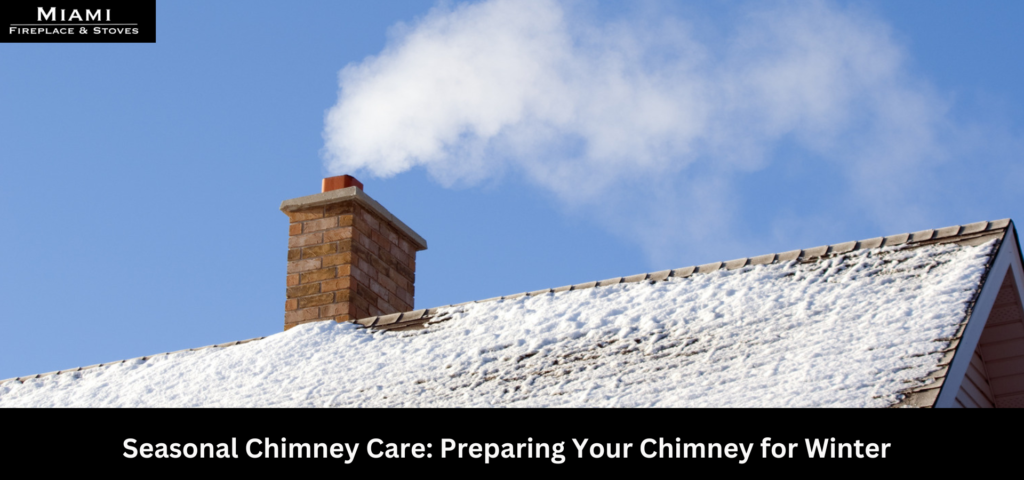
As winter approaches, ensuring that your chimney is in prime condition is vital for safety and efficiency. Proper chimney care is essential to avoid potential hazards and maintain a warm, safe environment in your home. This article outlines key steps to prepare your chimney for winter, with a focus on regular inspections, cleaning, and the benefits of professional care.
Why Seasonal Chimney Care is Essential
Winter weather can put extra strain on your chimney, making it more vulnerable to damage and blockages. Effective chimney care helps prevent issues like chimney fires, carbon monoxide leaks, and reduced heating efficiency. Preparing your chimney for winter involves several critical steps to ensure it functions properly throughout the colder months.
Key Steps for Effective Chimney Care
1. Schedule a Professional Chimney Inspection
The first step in preparing your chimney for winter is to schedule a comprehensive chimney inspection. A professional chimney sweep will examine both the interior and exterior of your chimney for damage or blockages. They will check for creosote buildup, chimney liner issues, and other potential problems that could affect your chimney’s safety and efficiency.
Importance of a Professional Inspection
A thorough inspection by a professional chimney repair expert provides a detailed assessment of your chimney’s condition. While DIY inspections might catch some obvious issues, a trained chimney sweep can identify less visible problems and recommend necessary repairs. Regular inspections, ideally performed annually, are crucial for maintaining chimney safety and efficiency.
2. Schedule a Chimney Cleaning
Chimney cleaning is a critical component of chimney care. Over time, creosote, soot, and debris can accumulate, reducing your chimney’s efficiency and increasing the risk of a chimney fire. Scheduling a professional chimney cleaning before winter ensures that your chimney is free from dangerous buildups and ready for use.
Benefits of Chimney Cleaning
Regular chimney cleaning helps ensure that smoke and gases are properly vented outside your home. This reduces the risk of chimney fires and improves the overall efficiency of your fireplace or stove. Additionally, it helps extend the lifespan of your chimney by preventing corrosive damage caused by creosote buildup.
3. Check for Blockages and Ensure Proper Draft
Blockages in your chimney can severely impact its performance and safety. Common blockages include nests, leaves, and other debris. Ensure that your chimney is free from obstructions by inspecting it or having it checked by a professional. Additionally, make sure your chimney has proper draft to efficiently expel smoke and gases.
Ensuring Proper Draft
A proper draft is essential for the effective operation of your fireplace or stove. It ensures that smoke and gases are directed outside, preventing backdrafts and improving indoor air quality. If you notice smoke filling the room or a reduced draft, it may indicate a blockage or other issues that need attention.
4. Install or Inspect Your Chimney Cap
A chimney cap is an important component that protects the top of your chimney from rain, debris, and animals. If your chimney cap is damaged or missing, consider having it repaired or replaced before winter.
Benefits of a Chimney Cap
A well-installed chimney cap helps prevent weather-related damage and keeps out unwanted pests. It also reduces the risk of water damage to your chimney and fireplace, which can be expensive to repair.
5. Check the Condition of the Chimney Liner
The chimney liner is a critical part of your chimney system, protecting the walls from heat and corrosion. Over time, the liner can deteriorate or become damaged. During a chimney inspection, the condition of the liner will be evaluated. Prompt repair or replacement is necessary if any issues are found.
Importance of a Properly Functioning Chimney Liner
A functional chimney liner prevents heat transfer to the surrounding masonry and reduces the risk of chimney fires. It also protects your chimney from corrosive gases. Regular inspection and maintenance of the liner are crucial for the overall health of your chimney system.
6. Ensure Your Fireplace or Stove is Ready
Before using your fireplace or stove during winter, ensure that it is in good working order. Check the condition of the firebox, damper, and other components. If your fireplace or stove has not been used for some time or shows signs of wear, consider having it inspected and serviced.
Preparing Your Fireplace for Winter
A well-maintained fireplace or stove enhances the efficiency of your heating system and provides a safe and enjoyable fire experience. Regular maintenance helps prevent issues such as inefficient burning and unsafe operation.
Trust Miami Fireplace & Stoves, Your Local Fireplace Store
Preparing your chimney for winter is vital for maintaining a safe and efficient heating system in your home. Regular inspections, cleaning, and maintenance help prevent potential hazards and ensure that your chimney operates smoothly throughout the season. For expert chimney care, including inspections and cleaning, visit a reliable fireplace store like Miami Fireplace & Stoves.
At Miami Fireplace & Stoves, we understand the importance of proper chimney care. Our team is dedicated to providing top-notch chimney inspections, cleaning, and repairs to keep your chimney in excellent condition. Reach out to us today to schedule your chimney service and experience the benefits of professional care. Visit Miami Fireplace & Stoves to ensure your chimney is clean, safe, and efficient for a cozy winter season.
Miami Fireplace and Stoves, LLC
59100 E 100 Rd, Miami, OK 74354
(918) 961-8764
